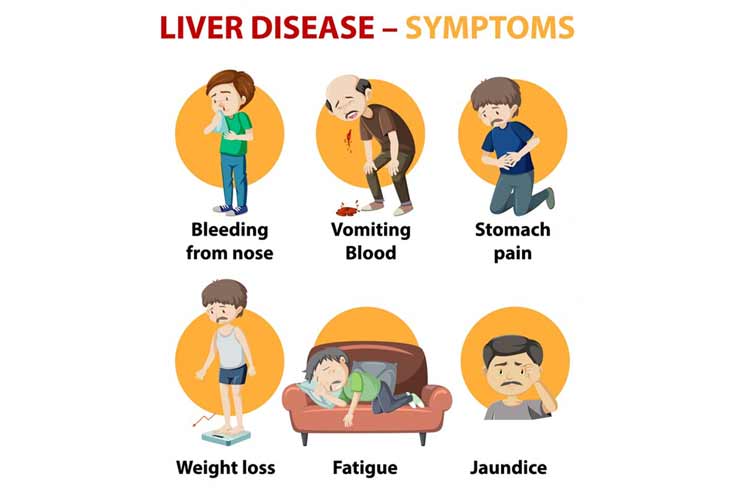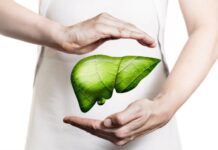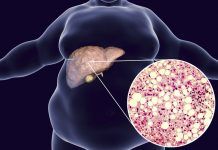Affiliate Disclaimer
Some links in this article are affiliate links. We may earn a small commission if you make a purchase through these links, at no extra cost to you. We only recommend products we find useful to our readersLiver health is essential for overall well-being since it plays an important role in various functions, such as detoxification, metabolism, and nutrient processing. Early detection of liver disease is very important to avoid dangerous complications and ensure treatment begins at the early stages.
Unfortunately, the liver doesn’t show many symptoms until the disease has progressed. Yet, recognizing the first signs of liver disease can improve outcomes and improve the quality of life.

Some of the common liver disease symptoms in the beginning stage include lethargy or fatigue, abdominal discomfort, and changes in skin color. Observing these early signs of liver disease can help people maintain liver health and seek timely medical advice to take action against the development of severe probable liver conditions.
Also, read: 12 Important Signs you have Toxic Liver
1. Fatigue and Weakness

Chronic liver disease can cause persistent fatigue and weakness, which can be continuous tiredness that interferes with daily activities. In contrast to circadian fatigue, which is due to lack of sleep or physiological tiredness, liver disease fatigue is chronic and does not quickly go away with rest. Its expression may range from mild to debilitating, affecting physical and mental activities.
Patients suffering from liver disorders, especially viral hepatitis, alcohol consumption, and fatty liver, generally complain of fatigue in varying intensity. Some patients feel exhausted with minimal hepatic injury, while some with end-stage liver disease do not have prominent fatigue. This fatigue is regarded as a result of liver dysfunction, which impairs detoxification and maintains normal energy.
Fatigue management in liver disease includes:
- Treatment of the underlying disorder.
- Management of secondary factors like anemia or sleep disorders.
- Lifestyle modifications that enhance energy.
Strategies include:
- Having the support of family and friends.
- Getting enough sleep.
- Eating a healthy diet.
- Practicing regular exercise.
There is no particular treatment for chronic fatigue, but this multifaceted approach can reduce its impact and improve the quality of life.
2. Jaundice

Jaundice is a noticeable yellowing of the skin and the whites of the eyes. This indicates an existing liver problem. It results from too much bilirubin, a yellow pigment that is the final product of haem breakdown in red blood cells. In a healthy liver, this bilirubin would be eliminated and excreted into the bile. However, when the liver malfunctions in liver disease, bilirubin cannot be eliminated; hence, the yellow color is caused by its buildup in the bloodstream.
Common jaundice symptoms include itching, dark urine, pale-colored stools, loss of appetite, and abdominal pain. It may be a result of various problems within the liver, including viral hepatitis, cirrhosis, and autoimmune diseases. It can also come with gallstones, pancreatic cancer, or blockage in the bile ducts. One should seek immediate medical attention to ensure a correct diagnosis and the selection of appropriate therapy since jaundice itself is a symptom and not a disease.
3. Abdominal Pain and Swelling

Pain or swelling in the upper right abdomen can be a sign of liver disease, which is usually linked to conditions like ascites. Ascites are the buildup of fluid within the abdominal cavity resulting from malfunctioning or cirrhosis of the liver. As it continues to accumulate, visible swelling develops with general discomfort and fullness in the abdomen. The fluid, as it accumulates, may press on surrounding organs, causing liver pain, and sometimes it can interfere with breathing.
It is usually associated with serious liver disease, including cirrhosis and liver cancer. Main symptoms include abdominal bloating, liver disease pain, and tightness in a tight and bulging abdomen. The swollen abdomen could be gradual or sudden, increasing discomfort.
Proper management includes treatment of the underlying liver problem, a low-sodium diet, the use of diuretics, and sometimes paracentesis to drain extra fluid. Any person who is suffering from persistent pain with swelling in the abdomen must visit a doctor for proper evaluation and treatment.
4. Nausea and Vomiting
Liver dysfunction may first manifest as nausea and vomiting, which are early symptoms of liver disease. These symptoms appear when the liver’s ability to process toxins and waste products is compromised, leading to digestive issues. Due to this, toxic substances and inflammation accumulate, causing liver disease and resulting in nausea and vomiting.
These symptoms may signify many liver diseases, such as hepatitis, cirrhosis, and liver cancer. Hepatitis can cause inflammation; cirrhosis may cause scarring, thereby impairing liver function. Liver cancer can make it difficult for the liver to work correctly, causing nausea and vomiting.
If these symptoms are persistent or are accompanied by other signs, such as jaundice or abdominal pain, it is important to see a doctor. Early detection and treatment can help manage the liver condition in its early stages.
5. Dark Urine and Pale Stools
Dark urine and pale stools are indicators of liver disease. Poor liver performance affects the color of urine and stool. The possible cause of dark urine is the accumulation of bilirubin, a by-product of the breakdown of red blood cells. It occurs in liver diseases like hepatitis, cirrhosis, or bile duct obstruction.
Conversely, clay-colored or pale stools may indicate that bile is not reaching the intestines, which is indicative of liver dysfunction or blockage of bile ducts. These changes reflect that the liver is impaired in processing and excreting waste products.
If one experiences these symptoms, it is advised to consult a doctor for further evaluation. If detected early, complications can be avoided, and the chance of improving liver health increases.
6. Itchy Skin

Pruritus, or persistent itchy skin, is a symptom of liver disease. This itchy skin liver disease is often a result of conditions like primary biliary cirrhosis and primary sclerosing cholangitis, where the concentration of bile salts increases in the blood. The mechanism of itching due to liver disease is still not fully known, but high levels of bile salts and histamines can be responsible.
Treatment involves managing symptoms and includes mild soaps, topical creams, and medication such as cholestyramine or sertraline. Avoiding scratching is suggested, as this prevents damage to the skin and infection.
If one has a very bad itch, primarily if it affects sleeping, they should see a doctor immediately. This will help them diagnose liver disease and begin appropriate treatment.
7. Loss of Appetite and Weight Loss
Loss of appetite and unexplained weight loss are potential liver disease signs. Decreased interest in food can result from liver compromise, inflammation, ascites, distortion of taste, or changes in digestion. Due to appetite loss, people tend to have poor food intake, causing a worsening health condition.
If you have a loss of appetite, try eating small, frequent meals and aim for nutrient-dense foods. Add snacks; use cold or mild-tasting foods if your taste has changed; and use smoothies or nutritional supplements if taking solid foods is a problem for you.
If these symptoms persist on an ongoing basis, your doctor should be consulted. They may suggest dietary changes or liver function tests. Proper management can help maintain health and support liver function.
Also, read: 7 Foods To Naturally Cleanse Your Liver
8. Bruising and Bleeding Easily
Easy bruising and bleeding are common symptoms of liver disease because the liver is involved in producing clotting factors. Diminished production, therefore, may mean a higher tendency to bleed or bruise when liver function is impaired.
Cirrhosis or hepatitis may impair the liver’s ability to metabolize proteins necessary for blood clotting. This results in fragile blood vessels that easily become damaged and likely to bleed. Besides, liver dysfunction can further cause platelet production problems, thereby increasing the risk of bleeding.
If you bruise easily for no apparent reason or bleed easily, you should visit your doctor. The earlier a doctor detects liver disease, the more effective they will be in managing such symptoms.
9. Mental Confusion and Memory Problems

Liver disease can lead to cognitive difficulties such as mental confusion and memory problems, known as hepatic encephalopathy. When the liver fails, it loses its ability to filter toxins, like ammonia, from the blood. With elevated levels of these circulating toxins, brain functioning could be affected, which means confusion or mental fogginess, forgetfulness, sleep pattern changes, and mood swings.
In severe cases, hepatic encephalopathy can cause drowsiness or even coma. It is characterized by various symptoms, which include difficulties with daily activities, tremors, and hand “flapping.” Infections, internal bleeding, constipation, or the use of some medications may trigger this.
Treatment often involves medicines like lactulose, which lowers the amount of ammonia, and the antibiotic rifaximin, which can help with symptoms as well. If you are aware of liver disease cognitive issues, notify your doctor for proper testing and management.
Conclusion
The early signs of liver disease should be known to everyone for the liver disease prevention and treatment of the complications associated with it. These can include nausea, dark urine, pale stools, itchy skin, and cognitive problems, which may indicate malfunctioning of the liver and needing urgent medical attention. Early diagnosis can remarkably improve the chances of successful treatment and a good quality of life.
If you are experiencing any of these warning signs and having any unusual feelings or changes in your behavior, then you must consult your doctor. Regular checkups can avoid severe complications, and liver health awareness helps give support to overall well-being. Proactive initiatives towards liver health ensure timely intervention and better handling of potential liver diseases.
Also, read: 5 Foods that Will Naturally Cleanse your Liver
References
- https://badgut.org/information-centre/a-z-digestive-topics/liver-disease-fatigue
- https://www.healthdirect.gov.au/jaundice
- https://www.medicalnewstoday.com/articles/318775
- https://www.medicalnewstoday.com/articles/liver-disease-symptoms
- https://www.healthline.com/health/liver-disease-and-itching
- https://www.hepatitis.va.gov/cirrhosis/patient/encephalopathy.asp
In this Article

















